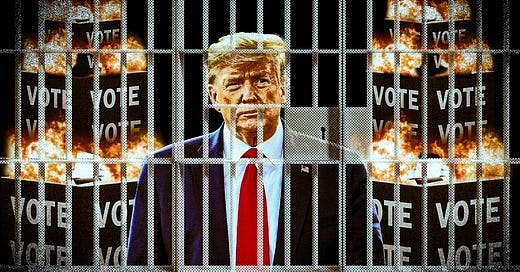Every state is operated by an organized minority, a ruling class. That class may rule by divine right, wealth, the authority granted by their birth, or even in the name of the people, but there will always be two groups: the rulers and the ruled.
Brutal warlords and dictators can rule through raw force for a time, but that is brittle power that can easily snap. Eventually, every regime requires a political formula that grants its rule legitimacy in the eyes of the public. In America and the wider Western world, elections are the only acceptable legitimating mechanisms for state power, while any other political formula is considered authoritarian.
Both major political parties have made a habit of calling the validity of America’s elections into question for decades, but with the federal indictment of former President Donald Trump on Tuesday, an incredibly dangerous line has been crossed. The criminalization of political opposition in America threatens to become a common feature of the electoral process, shattering the illusion of legitimacy that has held our decadent ruling class in power for so long.
Conservatives like to see their elections as practical affairs, a contest between two competitors in the marketplace of ideas vying for support and the chance to implement the priorities of their supporters. Once every four years, Americans walk down the supermarket isle and evaluate their choices for president as if they are selecting a brand of toothpaste, then go on about their business. But the relationship between rulers and the ruled is far more metaphysical than most voters are willing to admit.
Americans believe in popular sovereignty, and like the coronation of a king, elections are a ritual meant to affirm their faith in the system by which they transfer authority to the ruling class. Humans will always invest their leaders with some portion of their hopes, dreams, and identity. This might sound silly to modern ears, but one only needs to remember the fainting spells of supporters at Obama rallies or the former president’s speech about causing the waters of Earth to recede after his election to see this manifested on the left. The right’s constant worship of the ghost of Ronald Regan and the numerous pictures of Trump being guided by the hand of Jesus Christ shows that this is not a one-sided affair. When progressives now invoke “our sacred democracy,” they are speaking to a real belief people hold, whether they realize it or not, and the validity of that belief must be protected if a regime is to survive.
Donald Trump now faces three counts of criminal conspiracy and one count of obstruction for repeatedly and publicly questioning the fairness of the 2020 election. It should be obvious that making it impossible to question the fairness of a political process through the exercise of an individual’s First Amendment free speech protections ends any chance at substantive political opposition, and it is obvious. That is the point. The alleged co-conspirators named in the Trump indictment were attorneys who were offering advice to a client. It is not just the ability to question electoral results that is being threatened, but core aspects of due process and freedom of speech that are enumerated in the Bill of Rights.
Questioning the legitimacy of elections is a tradition as old as elections themselves. Voter fraud always has existed and always will exist at some level, and the fervent denial of that basic fact raises questions of its own. The slogan “vote early and vote often” has been jokingly used to refer to the wildly corrupt machine politics of Tammany Hall in New York or various leaders in Chicago. The highly disputed election of 1877, which ended with the installation of Rutherford B. Hayes in the Oval Office, required a back-room congressional deal to keep the nation from tearing itself apart again after the Civil War. American history is full of examples, but in general elections have conveyed legitimacy because individuals could exercise their right to free speech and raise questions if they felt the process was in some way compromised. Coronations are about the rigid transfer of unquestioned authority. Elections are not.
The first election to imprint itself on my political consciousness was the presidential contest between George W. Bush and Al Gore when I was in high school. As a native Floridian, it was impossible to ignore the fact that your home state was the center of the most controversial election in living memory. I vividly remember college professors, media pundits, and Democratic politicians endless challenging the validity of the election and attacking Bush as an illegitimate president who stole an election throughout both of his terms in office. No charges were brought and no one went to jail for their assault on “our sacred democracy." The ability of the other side to question the election did not create an existential threat to the political system.




The Democratic Party is no longer run by liberals. The Democratic Party is now the party of corporate serfdom. The Puritanical Satanism just fills up the coalition just like the country club Republicans depended on the Religious Right.
See the map here:
https://rulesforreactionaries.substack.com/p/populism-is-the-way?utm_source=profile&utm_medium=reader2
Threatening to shatter the myths of the regime? Anyone in Gen Z can tell you that the myths of the regime have been destroyed for a long time. No Gen Z or Millennial believes for a second in the farcical myths the regime tells itself. This is just burying zombie myths in the shallow grave they dug decades ago. Our Progressive elites are dispensing with these myths because they no longer benefit them. Our founding myths shattered when we began openly questioning their validity like Howard Zinn.